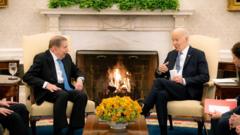U.S. President Joe Biden welcomed Edmundo González, an exiled figure from Venezuela's opposition, at the White House, where he called González the "true winner" of a contentious presidential election held last July. This endorsement comes in the wake of highly disputed election results that have plunged the Venezuelan political landscape into chaos. González fled to Spain in September following the election turmoil, during which incumbent President Nicolás Maduro declared victory, a claim that has been widely challenged both domestically and internationally.
The Maduro government responded sharply to the White House meeting, labeling it "grotesque" and accusing Biden of supporting what it perceives as a violent anti-democratic agenda. As the inauguration ceremony looms, set for Friday, tensions are escalating as both Maduro and González engage their supporters in claims to power.
In the lead-up to this pivotal day, the Maduro regime has strategically positioned thousands of police officers throughout the capital, Caracas, while also shutting down major road access—a move interpreted as an attempt to repress potential anti-government demonstrations. In stark contrast, González, undeterred by an outstanding arrest warrant, has vowed to return to Venezuela to assume leadership.
Despite the intensity of his resolve, González has not detailed how he intends to enter a country where authorities are actively seeking his arrest, offering a $100,000 reward for information leading to his capture. The situation is further complicated by the National Assembly's domination by government loyalists, which raises questions about how an oath of office could possibly be executed.
Nevertheless, the opposition is rallying and encouraging supporters to take to the streets this Thursday. González's tour has garnered international backing, including meetings with the presidents of Argentina and Uruguay, where he received considerable support from Venezuelan expatriates. An estimated eight million Venezuelans have relocated abroad to escape dire economic and political conditions, many settling in neighboring Latin American countries and the U.S.
Following the Biden-González meeting, the White House pledged to monitor the government's response to planned protests. The governmental landscape remains precarious, as the aftermath of the July election saw thousands of protesters arrested. Many of these individuals, labeled as "terrorists" by the regime, remain imprisoned.
Opposition leader María Corina Machado, barred from the election, expressed her intention to stand with González and instilled confidence in the possibility of mass mobilization against the Maduro government. She emphasized that Maduro’s power relies on instilling fear and that the voice of the Venezuelan people could not be silenced by a few armed individuals.
Central to the debate surrounding the election is the handling of voting tallies. The National Electoral Council proclaimed Maduro the victorious candidate on July 29, yet has failed to produce the necessary voting data to substantiate that claim. In contrast, the opposition successfully compiled and disseminated their own breakdown of the voting results, indicating that González might have secured approximately 67% of the votes as opposed to Maduro's reported 30%.
The United Nations Human Rights Committee intervened in December, ordering the Venezuelan government to refrain from destroying crucial election data. With political tensions at a boiling point and international scrutiny intensifying, the situation in Venezuela remains fraught with uncertainty, highlighting the complexities of a country in crisis.





















